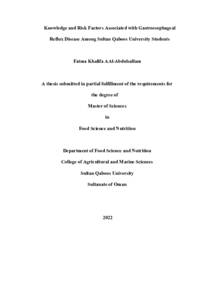Document
Knowledge and risk factors associated with gastroesophageal reflux disease among Sultan Qaboos University students.
Other titles
مستوى المعرفة وعوامل الخطر المرتبطة بمرض الارتجاع المعدي المريئي بين طلاب جامعة السلطان قابوس
Publisher
Sultan Qaboos University.
Gregorian
2022
Language
English
Subject
English abstract
Gastroesophageal reflux disease (GERD) is a chronic disorder where the stomach
acid flows back into the esophagus. Unhealthy dietary habits, such as intake of fried, fatty,
spicy foods, late-night meals besideslifestyle factors of smoking and physical inactivity have
been reported to induce reflux symptoms. The assessment of the disease knowledge among
populations is crucial to implementing successful prevention strategies. This study aimed to
demonstrate the prevalence, level of GERD knowledge, and risk factors associated with
GERD among Sultan Qaboos University students.
This cross-sectional study included 400 students from Sultan Qaboos University
(SQU) in Muscat, Oman. Study questionnaires were collected via Google online forms and
distributed to the students by email and social media applications (WhatsApp and Instagram)
for three weeks. The questionnaires included four sections: Sociodemographic information,
GERD knowledge, GERD diagnostic questions using the GERD Questionnaire (GERDQ a
diagnostic tool for GERD), and risk factors associated with GERD.
Out of 400 participants, 128 (32%) were diagnosed with GERD, and 272 (68%) did not
have GERD. The mean percentage of correct answers was 52%, with an average of 10 point
out of 20. The level of GERD knowledge differed significantly according to gender (P < 0.05).
Students' residence, lying down after eating, skipping breakfast, intake of fast food, spicy food,
and fried food 3 times or more per week, and consumption of soft drinks were significantly
associated with symptomatic GERD (P < 0.05).
In conclusion, identifying level of knowledge and incidence of GERD are key steps to
implement prevention and treatment strategies. Multiple modifiable factors risk factors
associated with GERD in the study sample. Prevention and treatment strategies are warranted to
address these factors to reduce or prevent the symptoms of GERD.
Member of
Resource URL
Category
Theses and Dissertations

